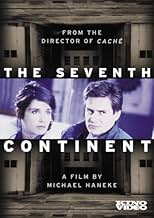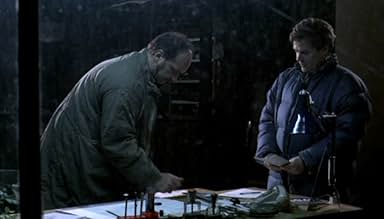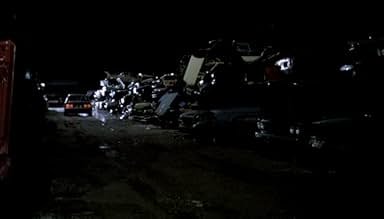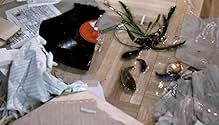Una familia europea que planea escapar a Australia, parece atrapada en su rutina diaria, solo preocupada por incidentes menores. Sin embargo, detrás de su aparente calma y existencia repetit... Leer todoUna familia europea que planea escapar a Australia, parece atrapada en su rutina diaria, solo preocupada por incidentes menores. Sin embargo, detrás de su aparente calma y existencia repetitiva, en realidad están planeando algo siniestro.Una familia europea que planea escapar a Australia, parece atrapada en su rutina diaria, solo preocupada por incidentes menores. Sin embargo, detrás de su aparente calma y existencia repetitiva, en realidad están planeando algo siniestro.
- Dirección
- Guionistas
- Elenco
- Premios
- 2 premios ganados y 1 nominación en total
- Self
- (material de archivo)
- (sin créditos)
- Dirección
- Guionistas
- Todo el elenco y el equipo
- Producción, taquilla y más en IMDbPro
Opiniones destacadas
The Schobers, husband George (Dieter Berner), wife Anna (Birgit Doll), and daughter Eva (Leni Tanzer), are the happily married family living next door. George is an engineer and Anna an optician. Eva is a bright child of about eight with deep, expressive eyes. The family moves through their morning ritual with precision -- brushing their teeth, feeding the fish, and eating breakfast with little conversation or emotional interaction. The camera avoids their faces, focusing on mundane objects such as a bowl of cereal, an alarm clock, a fish tank, a package of congealed broccoli. This preoccupation with objects underscores the lack of connection between the characters and the things they have acquired. We get our first hint that something is not right when Eva pretends to her teacher that she has lost her eyesight. Anna questions her about the incident, promising not to harm her if she tells the truth but, when Eva admits to the lie, suddenly slaps her across the face ignoring the fact that she is a very troubled little girl. It is from here that the cracks begin to widen.
Depicting ritualistic actions like counting of money at a supermarket, the distractions of television, the meaninglessness of work, the film reflects the powerlessness and isolation of people in modern society. Haneke chronicles a family enslaved to the structures they have created, operating in a morass of emotional vacuity. The first hour may seem slow but it builds considerable tension until it reaches a shattering climax. Little by little the family disengages. George quits his job and writes letters to his parents hinting of something dark about to happen. In the absence of a spiritual core, without the possibility of meaningful action, the family sinks deeper into an abyss, unraveling and discarding the tightly woven structures of their life. Similar in theme to Todd Haynes' 1995 film Safe but with three times the power, The Seventh Continent is a ruthlessly intelligent film that burns its way into your psyche, leaving an indelible mark that will forever haunt your dreams.
This was Haneke's first theatrical film & apparently based on a true story--although I'm always skeptical of such disclaimers (the same was said about "Picnic at Hanging Rock," another great creepy film). It's divided into 3 parts: 1987, 1988, and 1989. Many scenes repeat themselves, and we get a clear sense that the family (dad, mom, daughter) is going through the motions of modern life. The banalities have a bizarre and uneasy edge to them, though, that really piles up by the time Part 3 arrives. All I have to say about the last 40 minutes is: OH MY GOD! I thought Gaspar Noe's "I Can't Sleep" (?) had an excruciating buildup, but that one (with all its explicitness) can't hold a candle to the amount of emotional and physical devastation packed into the conclusion of "Continent."
Fans of Haneke's later work should definitely check this one out to see the origin of his trademarks: no music score, seemingly pointless scenes that linger (often with little or no dialogue), off-putting camera angles (we sometimes see only the actors' hands or feet). While these techniques aren't always successful in his films ("Code" had some interminable moments), they all come together seamlessly in "Continent." A superb work!
The film wasn't totally a let down however; far from it. The last 45 minutes really picks up intensity and re-grabs the viewer's interest. I won't spoil anything for those who haven't seen it, but the scene in which the family destroys their own house and possessions is extremely well done. The ending is bleak and depressingly powerful, and I realized that it wouldn't have worked without the boring first hour. But that doesn't change the fact that it was boring.
Overall, I had trouble giving this film a number rating, but I guess it would be somewhere around a 6/10. I think it's possible that that number would change on a second viewing, but to be honest, I doubt I would ever want to watch this film again.
¿Sabías que…?
- TriviaBased on real events.
- Citas
Georg Schober: We have to cancel the newspaper subscription
Anna Schober: Mhm
- ConexionesFeatured in Selección TCM: Michael Haneke (2012)
- Bandas sonorasSend Me Roses
(uncredited)
Written by Günter Mokesch and Karin Raab
Performed by Günter Mokesch and Karin Raab
Selecciones populares
- How long is The Seventh Continent?Con tecnología de Alexa
Detalles
Contribuir a esta página



























